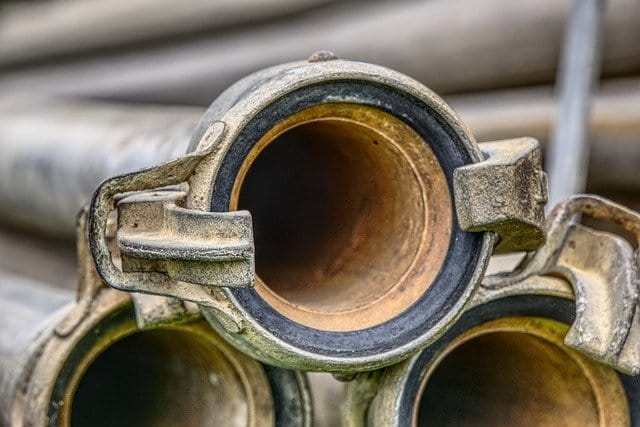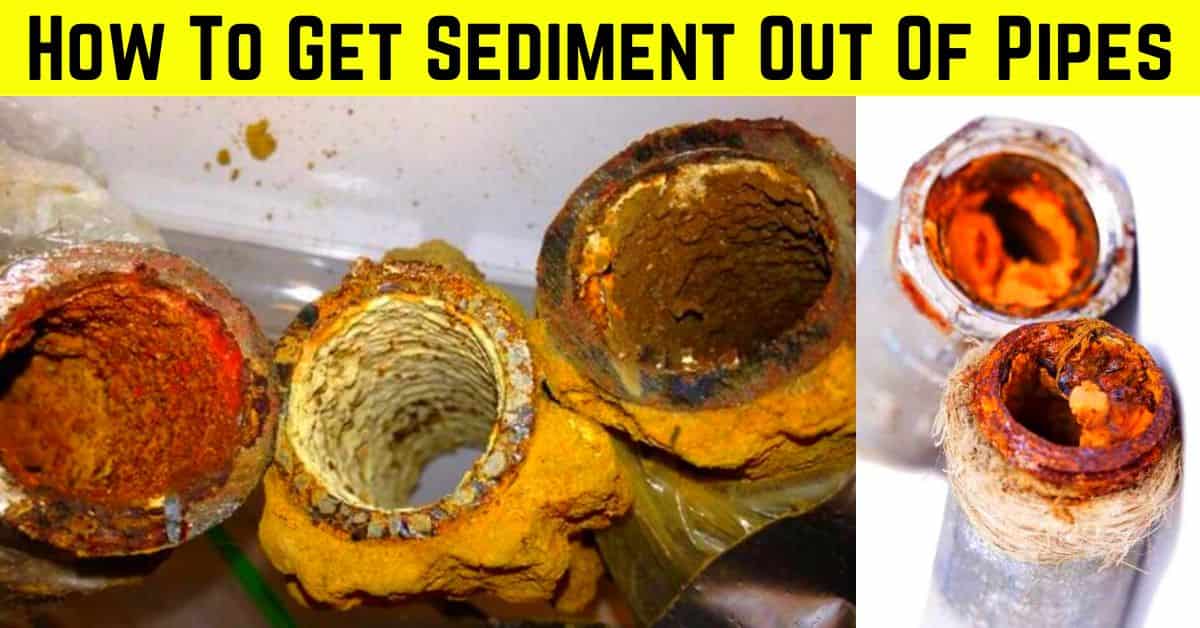If you live in an area with a lot of sediment in the water, you know it can cause severe problems for your plumbing.
Not only does the sediment clog your pipes, but it can also corrode them over time.
In this article, we’ll cover a few ways to get that sediment out of your pipes, keep them functioning correctly, and also provide tips for avoiding future blockages.
What Are Some Common Causes Of Sediment Build-Up In Pipes?
A few different things can cause sediment to build up in your pipes.
1. One of the most common causes is pipe scale. The build-up of water minerals inside your pipes can happen over time as water flows through them.
It can cause severe problems for your plumbing because it can restrict water flow and cause clogs.
2. Next are sediment build-up and corrosion. It happens when the pipes themselves start to break down and erode.
It can be caused by several things, including old age, spring water contaminants with a high acidity level, or even just exposure to the elements.
Corrosion can also cause your pipes to break down and erode from the inside out, leading to even more severe problems.
If you have sediment build-up in your pipes, cleaning it out as soon as possible is essential. Otherwise, you could have a plumbing issues emergency on your hands.
Best Tips To Get Sediment Out Of Pipes?

If you live in an area with a lot of sediment in the tap water, it can build up in your pipes and make them much less effective at doing their job.
The good news is that there are a few things that you can do to clean out the sediment and keep your pipes in good condition.
Here are a few tips for how to get the sediment out of pipes:
1. Use a plunger
It is usually the first step when people notice that their plumbing is not working as well as it should be.
If you think there might be some sediment build-up in your pipes, you can use a plunger to dislodge them.
Put the plunger over the floor drain hose and push and pull it up and down. You might need to do this a few times before dislodging the sediment.
2. Use a natural cleaner
You can try using a natural cleaner if you do not want to use chemicals to clean your pipes.
One option is to pour boiling water down the drain. It will help break up any sediment blocking the flow of water.
Another option is to water a mixture of baking soda and vinegar and then pour this down the drain.
The baking soda and vinegar will react together and help to break up the sediment.
3. Use a commercial cleaner
You can buy many commercial cleaners that help remove sediment from your pipes.
Usually, these cleaners are found at your local hardware or home improvement store.
Follow the instructions on the bottle and let it sit for a few minutes, then flush the drain with hot water.
Repeat this process if necessary.
4. Call a professional
If you have tried all of the above tips and still have problems with sediment in your pipes, you might need to call a professional.
A professional plumber can use a power drill or hydro jetting to clean your pipes and remove the sediment.
5 Tips Before Cleaning Sediment from Water Lines
If you have hard water, there is a good chance that mineral analysis in the brown water will accumulate in your pipes over time.
It can lead to many problems, from decreased water pressure to complete blockages.
If you notice that your water pressure is dropping or your pipes are making strange noises, it may be time to clean out the sediment.
Here are a few tips:
- Start by disconnecting any appliances that are connected to the affected pipes. It includes dishwashers, washing machines, and any other water-using appliances.
- Next, locate your home’s main water shut-off drain valve and turn it off. It will prevent brown water from entering the affected pipes and worsen the problem.
- Once the water is shut off, open all the faucets in your home to drain any remaining water from the pipes.
- Now it’s time to start disassembling the affected pipes. It may require some tools, depending on how the lines are configured.
- Once the pipes are disassembled, thoroughly flush the sediment with clean water. You may need to repeat this process several times to remove all the deposits.
Other Options To Prevent Excessive Sedimentation In Pipes:
- Use a water softener- You can use a water softener to remove sediment from your discoloured water.
- Install a whole-house filter- A whole-house filter will remove sediment from your whole water as it enters your home before getting into your pipes.
- Use a sediment filter- A sediment filter can be installed inline on your home’s water supply line to filter out sediment.
If you already have sediment in your pipes, there are a few options for removing it:
- Use a plunger– You can use a plunger to break up and remove sediment from your pipes.
- Use a plumber’s snake– You can use a plumber’s snake to break up and remove sediment from your house water pipes.
- Flush your pipes– Running hot water lines through your pipes at a high velocity can help flush out the sediment that has built up inside them.
Tips For Avoiding Future Sediment Blockages In Your Water Line:
1. Know your well water source. If you have a private well, have it professionally tested at least once a year to ensure the water quality has not changed?
2. If you use city water, be aware of any changes in the appearance or smell of your water, which could indicate changes in the water quality. Contact your city’s water department if you notice any changes.
3. Have your water line inspected and cleaned regularly by a professional plumber.
It will help to remove any excess sediment that has already built up in the line and can also help to identify any potential problem areas.
4. Consider installing a whole-house filter system. It can help remove sediment build-up from your water supply before it enters your rusted pipes.
5. Be mindful of what you dispose of in your sink, bathtub, and toilet. Avoid disposing of grease, food scraps, and hair, which can all contribute to sediment build-up.
6. Call a professional plumber immediately if you notice any changes in your water pressure or slow flow. It could signify a sulfur sediment blockage in your rusty pipes.
By following these tips, you can help to ensure that your PVC pipes remain clear and free of sediment build-up.
If you notice a blockage, don’t hesitate to call a professional licensed plumber for help.
Does Having Sediment In Your Water Line Harm Your Plumbing?
Sediment can build up in your pipes over time, and if it is not removed, it can eventually cause the lines to become clogged.
It can lead to decreased water pressure and reduce the life of your plumbing. If you suspect that you have sediment in your pipes, it is essential to remove it immediately.
Several ways to remove sediment from your pipes include using a plunger or an entire plumbing snake as we explained above.
However, contacting a professional plumber is the best way to remove sediment.
Plumbers have the tools and experience to safely and effectively remove sediment from your pipes. They can also advise you on how to prevent it from returning as shown in this video:
Conclusion: (Best Tips To Get Sediment Out Of Pipes?)
Sediment in your freshwater line can cause several problems, ranging from decreased water pressure to complete blockages.
Fortunately, you can do a few things to get sediment build-up out of pipes.
Ensure your cold water line is inspected and cleaned regularly, and consider installing a whole-house filter system.
If you notice a blockage, don’t hesitate to call a professional plumber for help.
FAQs
How Often Should I Have My Water Line Inspected And Cleaned?
Ideally, it would help if you had your fresh water line inspected and cleaned every year.
However, if you live in an area with high water sediment levels, you may need to have it done more frequently.
Can I Use A Plunger To Clear A Sediment Blockage In My Pipes?
If the blockage is small and localized, you may be able to use a plunger to clear it.
However, if the blockage is more significant or widespread, you must call a professional plumber for help.
How Can I Tell If I Have A Sediment Blockage In My Pipes?
Common signs of sediment blockage include decreased water pressure, reduced cold water flow, and strange noises from your pipes.
If you notice any of these things, call a professional plumber for help.
Can Sediment Build Up In My Pipes Even If I Have A Water Filter?
Yes, sediment can still build up in your pipes even if you have a water filter. It is why it’s essential to have your pipes inspected and cleaned regularly by a professional.






